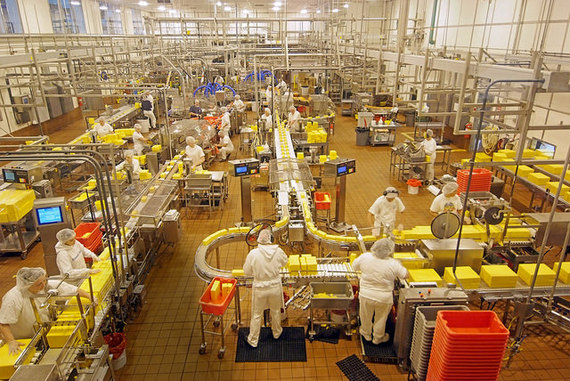When I was a kid, processed cheese was a family camping staple. It tasted great, melted beautifully and, most importantly, didn't spoil easily. We didn't think of it as "processed cheese food," or wonder what exactly it was made out of. And we certainly didn't suspect that the plastic it was wrapped in might be leaching hormone-disrupting chemicals into our campfire dinners.
Little did we know that research now points to chemicals in food packaging as yet another hidden threat to our health from America's industrial food system. It's challenging enough to avoid the pesticides, artificial food colorings and added sugars that are part and parcel of so much food in America. But even the most diligent among us would find it hard to avoid a class of toxic chemicals called phthalates, which can seep into food from plastic packaging and equipment used in food processing.

("Food processing," Oregon Department of Agriculture, via Flickr)
Phthalates make plastic supple. They are used in plastic wrapping as well as plastic tubing, workers' gloves and other food processing equipment. Phthalates leach into the foods they come in contact with, and because they're chemically attracted to fat, they are especially likely to leach into fatty foods like cheeses and meats.
Phthalate exposure is a serious health issue. Even at low levels, they can interfere with human hormones. Animal studies have linked phthalates to a host of serious health concerns, including birth defects, allergies and damage to the male genitals. While phthalates are also used in other consumer goods, diet appears to be the primary way people in the United States are exposed to these dangerous chemicals. Since these phthalates get into food from packaging or processing, they will never be revealed on the label, which makes it almost impossible to know if phthalates have leached into your groceries.
The FDA currently allows 30 different types of phthalates to be used in food packaging and processing equipment -- and thus allows phthalates to sneak into your food. The agency's approval doesn't take into account the growing body of research on phthalates, which has linked at least two types -- DEHP and DiNP -- to cancer, male birth defects and impaired reproduction.
To protect against these harms, Earthjustice and our partners recently filed a petition to the FDA asking the agency to withdraw its approval of all 30 phthalates in food contact material, including those that are not well studied but are chemically similar to phthalates known to cause harm. We must ban these chemicals from use in food packaging and processing in order to protect ourselves and our families.
You can speak out against phthalates, too, while the FDA considers our petition.
Fertile Grounds is a blog series that examines the challenges and opportunities in ensuring access to healthy, sustainable and affordable food for all. We talk about the entire lifecycle of food--from seed selection and planting to consumption and disposal -- because there is potential for improvement throughout. We're informed by the expertise of our many clients and allies and by Earthjustice's years of work to ban harmful pesticides, encourage sustainable farming methods, reduce pollution, support farmworker justice and promote a healthy relationship between farmers and communities.